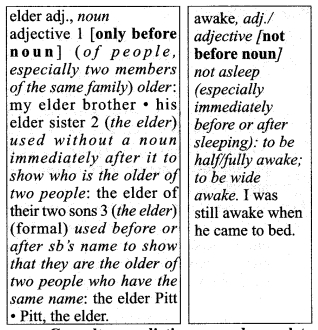Evelyn Glennie
Thinking about language
(Page 26)
Question 1.
Look at these sentences.
- Evelyn was determined to live a normal life.
- Evelyn managed to conceal her growing deafness from friends and teachers.
The italicized parts answer the questions:
“What was Evelyn determined to do?” and “What did Evelyn manage to do?” They begin with a to-verb {to live, to conceal). Complete the following sentences. Beginning with a to-verb, try to answer the questions in brackets.
- The school sports team hopes ………….. (What does it hope to do?)
- We all want ………….. (What do we all want to do?)
- They advised the hearing-impaired child’s mother ………….. (What did they advise her to do?)
- The authorities permitted us to ………….. (What did the authorities permit us to do?)
- A musician decided to ………….. (What did the musician decide to do?)
Answers:
- to win
- to succeed
- to take her to a specialist
- play
- play a new Raaga
Question 2.
From the text on Bismillah Khan, find the words and phrases that match these definitions and write them down. The number of paragraph where you will find the words/phrases has been given for you in brackets.
- the home of royal people (1) …………..
- the state of being alone (5) …………..
- a part which is absolutely necessary (2) …………..
- to do something not done before (5) …………..
- without much effort (13) …………..
- quickly and in large quantities (9) ………….. and …………..
Answer:
- royal residence
- solitude
- an indispensable component
- improvise
- effortlessly
- thick; fast.
Question 3.
Tick the right answer.
- When something is revived, it (remains dead/lives again).
- When a government bans something, it wants it (stopped/started).
- When something is considered auspicious (welcome it/avoid it).
- When we take to something, we find it (boring/interesting).
- When you appreciate something, you (find it good and useful/find it of no use).
- When you replicate something, you do it (for the first time/for the second time).
- When we come to terms with something, it is (still upsetting/no longer upsetting).
Answers:
- lives again
- stopped
- welcome it
- interesting
- find it good and useful
- for the second time
- no longer upsetting
Question 4.
Dictionary work
- The sound of the shehnai is auspicious.
- The auspicious sound of the shehnai is usually heard at marriages.
The adjective auspicious can occur after the verb 'is' as in the first sentence, or before a noun as in the second. But there are some adjectives that can be used after the verb be and not before a noun. For example:
- Ustad Faiyaz Khan was overjoyed.
We cannot say: *the overjoyed man.
Look at these entries from the Oxford Advanced Learner’s Dictionary (2005).
Consult your dictionary and complete the following table. The first one has been done for you.
| adjective | only before noun | not before noun | both before and after the verb be |
| indispensable | ✓ | ||
| impressed | |||
| afraid | |||
| outdoor | |||
| paternal | |||
| countless | |||
| priceless |
Use these words in phrases or sentences of your own.
Answer:
| adjective | only before noun | not before noun | both before and after the verb be |
| indispensable | ✓ | ||
| impressed | ✓ | ||
| afraid | after the verb be | ||
| outdoor | ✓ | after the verb be | |
| paternal | ✓ | ✓ | |
| countless | ✓ | ||
| priceless | after the verb be |
Sentences
- My sister seemed impressed with his work.
- She is afraid of her father.
- I really like the outdoor games.
- He lives in the parental home.
- The District Library has countless reference books.
- Your gift is priceless.
Speaking
(Page 28)
Question 1.
Imagine the famous singer Kishori Amonkar is going to visit your school. You have been asked to introduce her to the audience before her performance. How would you introduce her?
Here is some information about Kishori Amonkar you can find on the internet. Read the passage and make notes of the main points about:
- her parentage
- the school of music she belongs to
- her achievements
- her inspiration • awards
Padma Bhushan recipient Kishori Amonkar, widely considered the finest female vocalist of her generation, was born in 1931. She is the daughter of another great artist, Smt. Mogubai Kurdikar. In her early years, she absorbed the approach and repertoire of her distinguished mother’s teacher Ustad Alladiya Khan. As her own style developed, she moved away from Alladiya Khan’s ‘Jaipur-Atrauli Gharana’s style in some respects. As a mature artist, her approach is usually regarded as an individual, if not unique, variant of the Jaipur model.
Kishori Amonkar is a thinker. She is besotted by what she calls the mysterious world of her raagas. She dissects them with the precision of a perfectionist, almost like a scientist, until the most subtle of shades and emotions emerge and re-emerge.
She is very much inspired by the teachings of the ancient Vedic sages, written at a time when vocal music was highly devotional in character.
This soul-searching quality of her music, coupled with a very intellectual approach to raaga performance has gained her quite a following in India and has helped to revive the study of khayal.
Significant awards bestowed on this artist include the Sangeet Natak Akademi Award (1985), the Padma Bhushan (1987), and the highly coveted Sangeet Samradhini Award (considered one of the most prestigious awards in Indian Classical Music) in 1997.
Answer:
Do it yourself.
Question 2.
Use your notes on Kishori Amonkar to introduce her to an imaginary audience.
You may use one of the following phrases to introduce a guest:
I am honoured to introduce…/! feel privileged to introduce…/‘We welcome you’…
Answer:
It’s my proud privilege that I have been honoured to introduce you to the famous singer Kishori Amonkar, the finest female vocalist of her generation. She was born in 1931 to the great artist Smt. Mogubai Kurdikar. She is a thinker who dissects the raagas with the precision of a perfectionist so that the raagas can be inspirational for the common masses. She is greatly inspired by the teachings of the ancient Vedic sages. She is conferred with significant awards viz., the Sangeet Natak Akademi Award (1985), the Padma Bhushan (1987), and the highly coveted Sangeet Samradhini Award in 1997.









0 Comments
If you have any query just drop down a comment